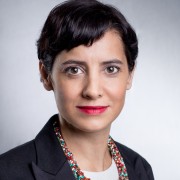On the global scale, Israeli youth are falling behind in academic achievements.
According to recent research conducted by PISA (Program for International Student Assessment), Israel is in the bottom 40 percent in mathematics and science. Israel consistently trails behind countries such as China, Singapore, Japan, South Korea, Switzerland and Austria.
Yet it has the highest density of startups per capita in the world and is ranked No. 2 in innovation, according to the World Economic Forum’s competitiveness report.
How is a country so successful in technological entrepreneurship, which demands extensive knowledge in mathematics, science, finance and business, so far behind in math and science education?
Andreas Schleicher, Director for Education and Skills and Special Advisor on Education Policy to the Secretary-General at the OECD, was asked a similar question when he was in Jerusalem recently for an international conference of education ministers.
“You don’t have more talent than other countries, but I checked it out thoroughly and I think your secret is that you know how to take advantage of talent better than others,” he answered thoughtfully.
There is a gap between what is necessary to excel in standardized testing and what is required to succeed as an entrepreneur and innovator.
PISA evaluates students based on their ability to provide specific answers on a standardized test. Neither the Israeli education system nor the Israeli culture is good at teaching children to do this.
This “shortcoming” appears to motivate children to become innovators and entrepreneurs.
Across the board, once children are in elementary school their curiosity and motivation to learn wanes. They are instructed to absorb knowledge for the sole purpose of regurgitating it. Generally, children are not encouraged to ask questions, suggest novel solutions, ideas or interpretations, or to initiate.
This method of teaching, while standard worldwide, is not particularly engaging or effective. Indeed, the methods used in the Israeli public education system are not any different. However, Israeli culture is highly tolerant of out-of-the-box thinking, even in its educational institutions.
Being open to new ideas is a great start, but children must be taught how to come up with new ideas by leveraging their knowledge, and then how to push these ideas forward. Unfortunately, these skills are not generally taught in public schools. Luckily, Israel is highly accommodating of informal educational programs with novel approaches.
Gvahim (Heights) and Magshimim (Accomplish) are two programs that teach us a lot about educating children to become innovators.
These extracurricular programs facilitate computer science and cyber learning for gifted children ages 12 to 18. They were initially founded to better prepare Israeli youth for the intelligence units of the Israel Defense Forces, but today these programs are partly responsible for educating Israel’s skilled high-tech workforce.
Adi Sharabani, founder and CEO of Skycure, an army reservist and one of the programs’ instructors, explains, “What we do in these programs is we take a child’s ability and we make him or her run with it. The purpose, therefore, is not to teach the kids a certain skill in the sense of how-to. The purpose is the vector, the movement, the progress itself, as opposed to the final goal.”
Sharabani says their secret lies in making the children get “stuck.”
“We want to figure out how to teach a child to take a skill that he has acquired and apply it to something completely different, how to transfer it to a new area. And the way to do that is by bringing him to a place where he is stuck, where he does not know the answer and no one will give it to him… Therefore, true growth, true teaching, comes from that place of not knowing the solution and having to come up with one anyway.”
This approach goes beyond cyber or coding. It is applicable to all aspects of life. It’s about putting oneself in a position where finding a solution is challenging and thought-provoking. The core of the program’s success and popularity is based on the idea that true learning comes when one seeks knowledge for oneself.
Gilad Lifshitz, a 17-year-old participant in Magshimim, describes how the learning takes place: “We are thrown into the deep end without giving it too much thought. We are given basic coding skills and then we are challenged by complex assignments such as building a chess game, without instructions, in an autodidactic way.”
Daring to solve something on your own is a pillar of entrepreneurship. Equally significant, the programs contradict the image of the teacher as the expert and the inexhaustible source of knowledge.
Sharabani recalls: “At first, when we started training schoolteachers, it looked like it was going to be a complete flop for the simple reason that the teachers did not have enough experience and expertise in the field.
“But what happened next was fascinating. It created scenarios whereby teachers looked a kid in the eye and said honestly, ‘I don’t know.’ This suddenly brings us to a place where teachers and students are actually in dialogue; they are brainstorming. One does not simply feed data to the other. Rather, they both grow together, and they reach places no one has been to. The teacher, in this approach, is not a funnel of facts, but a conveyor of methodology.”
Looking at failures, not successes
Likewise, assessment methods in these programs are radical. Rather than measuring the students’ successes, the instructors measure their failures as a better indicator of their learning.
“If you manage to solve 20 exercises, I, as an educator, have wasted your time. Since you already knew how to solve [the exercises], you made no progress; you’ve learned nothing,” says Sharabani.
Making students search for the answers and challenging them to the point of failure prepares them well for startup careers.
A few weeks ago, Israeli Prime Minister Benjamin Netanyahu declared the establishment of the National Center for Cyber Education, with an aim to “increase the number and raise the level of young Israelis for their future integration into the Israeli security services, industry and the academic world.”
In existing cyber education programs in Israel, students mostly learn skills. Not specific knowledge. Programs like Gvahim and Magshimim demonstrate the extent to which youth in Israel are seen as colleagues.
Sagi Bar, former head of human capital development at the Israeli Cyber Bureau and CEO of Magshimim, believes “it is an attitude that views children as people with an incredible ability to absorb, understand and deal with challenges. We encourage their creativity and entrepreneurship, and then we let go and see what happens. They always take it much farther than we’ve ever imagined.”
Israeli children may not score high on PISA surveys, but they certainly don’t fall behind when it comes to learning skills. It is the learning process and not the test results that are crucial. It is not so much what our children know, but rather how they came to know it. So let your kids get stuck. They will always learn something on the way.
Inbal Arieli was a lieutenant in the elite IDF intelligence 8200 unit and later took leading roles in the Israeli high-tech sector. She is a senior advisor to Start-Up Nation Central and is currently co-CEO of Synthesis. Inbal is working on an exploration of how Israeli culture breeds entrepreneurs from a young age. You can follow her on her blog or on Twitter, Facebook and Medium.

















